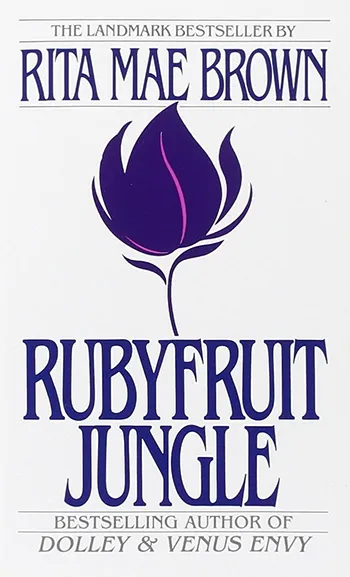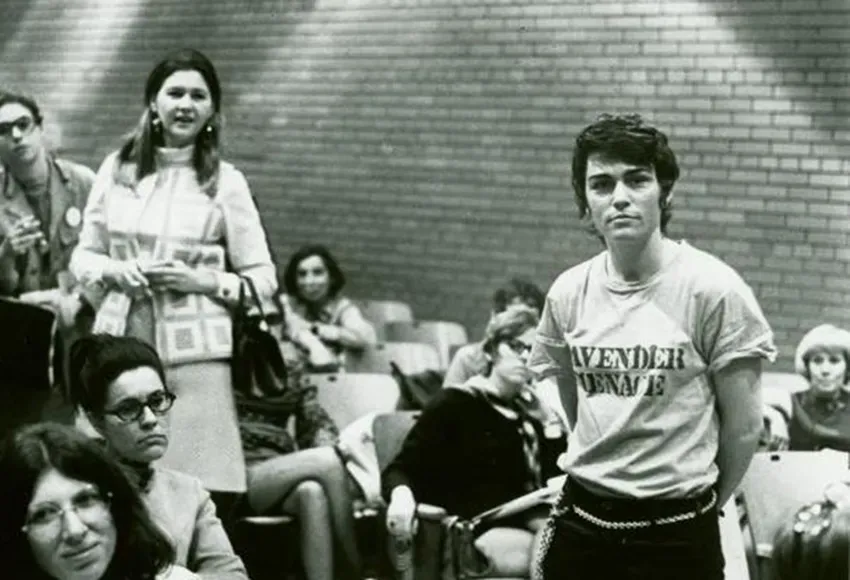
RUBYFRUIT JUNGLE
Rita Mae Brown
© 2015 Bantam Books
© 1973 Rita Mae Brown
$18.00
240 pages
Content warning: Pedophilia, incest, sexual assault, homophobia, racism
Some books are masters of a shocking twist. You turn the page and your jaw drops as you're absolutely floored by a plot turn out of nowhere.
That moment came when I finished the last sentence of Rubyfruit Jungle, turned the page, and found out that this Rita Mae Brown – the author of the salacious, boundary-pushing, semi-autobiographical Lesbian drama – was also that Rita Mae Brown, author of Mrs. Murphy's cozy murder mysteries, whose titles feature cat puns like Murder She Meowed. Her cat, Sneaky Pie Brown, is her co-author, and he signs off his prologue with a paw print.
Truly, as that one Gay poet said, we contain multitudes.
Rubyfruit Jungle came to my attention after watching The Incredibly True Adventure of Two Girls in Love. The love interest's homophobic friends read it aloud while cruising in their convertible, and it convinces them to not hate the Gays. A Gay evangelism book whose title is a vagina euphemism? Such a book deserved investigation.
After reading it, I can confirm that this is absolutely not the book to give to anyone who hates Gays – and probably not to most people who like Gays, either. It follows the 1970s instant-bestseller pattern. That is, take a protagonist with a marginalized identity, mix in sex and violence, sprinkle liberally with incest, and laugh all the way to the bank.
Rubyfruit Jungle closely parallels the author's early life. Molly, the stand-in protagonist, like Brown herself, was born poor and adopted. Her mother often screams at her and disparages her bastard identity. Molly sleeps with her cousin but otherwise attempts to eschew redneck stereotypes. She's brilliant, funny, and charismatic, and becomes the class president before getting a full-ride scholarship to University of Florida.
The story then closely follows many a Lesbian pulp. She sleeps with her roommate, gets institutionalized, is thrown out of her sorority, and hightails it to New York, where she hopes to find her future in Greenwich Village.
This period is sprinkled liberally with her conquests. An older actress tries to turn her into a kept woman, which she refuses. She falls in lust with a married professor, Polina, and Molly forces their first sexual encounter using the "Baby, It's Cold Outside" defense that women aren't allowed to say yes, and therefore shouldn't be listened to when they say no. In a bid to get closer to this professor, she also sleeps with both Polina's gingivitis-afflicted affair partner and her 16-year-old daughter. Yeah. Not exactly a fun summer convertible read.
In addition to being a monster, Molly has an interesting relationship to labels. In the introduction, Brown goes on a long rant about how they are useless. However, Molly, whenever she's asked, proudly declares herself a Lesbian and is hurt by a woman who refuses to admit she is too. When Molly is told she is Queer, however, she bemoans that everyone has to be stuck in a box. This wrestling is an understandable reaction to the way labels have been used against her. From when she was little, she understood she was a bastard and that it was a terrible thing to be. When she grows older, she views herself as a redneck and is determined to "overcome" it by learning to speak and dress as she sees wealthier students do.
Even when she is confident that she is Gay, which she knows from a young age, she passes as straight and does not disclose that she is a Lesbian unless she's asked (typically by a straight woman she's about to sleep with, at which point she declares it loudly and self-congratulatorily). After all, to come out at all during this period is incredibly brave, and she pays for it: she loses her scholarship, loses friends, and is shunned by her family.
At the same time, her privilege of being beautiful, femme, and straight-passing work in her favor, and she chooses not to interrogate these advantages. She is, instead, defensive of them to the extent that she will critique others who don't respect the systems she's benefited from. For example, she despises butches. It's beyond her why someone who would choose to question sexual norms would also choose to question gender norms.
So that's Rubyfruit Jungle. Of Brown's works, I can't say it's the one I recommend most. But The Purrfect Murder? Sign me up.


